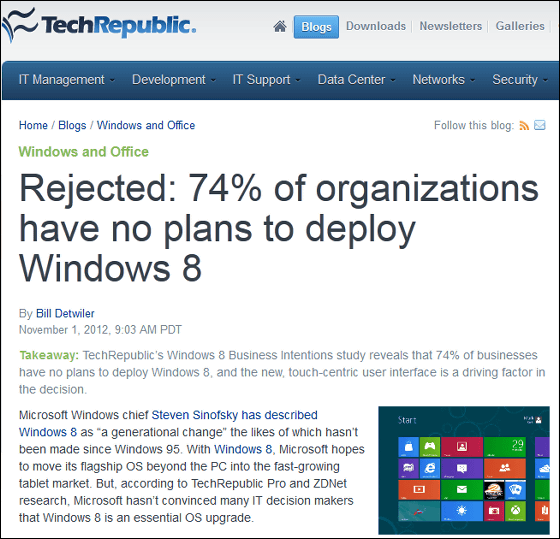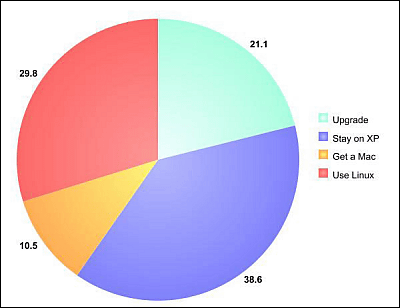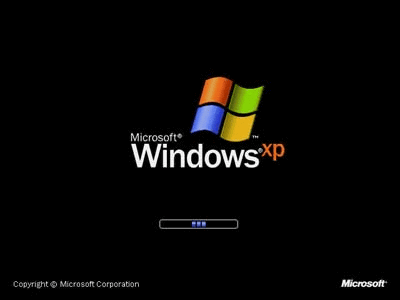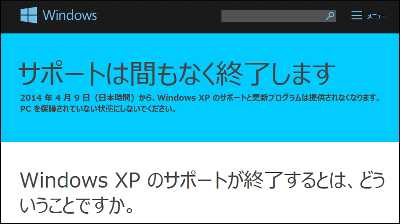74% of IT staff did not consider transition to Windows 8

ByJasonTromm
The release of Windows 8 began on October 26th. It evolved from old-fashioned aspects such as desktops and start menus, which had not changed significantly for a long time, to a new form called Modern UI,Stephen SinowskiWindows president said that "Windows 8 is" generation change "since the time Windows 95 came out," but the reaction on the user side is rather cool. According to the questionnaire result of the company's IT staff, 73.7% of the respondents answered "No plan to install Windows 8".
Rejected: 74% of organizations have no plans to deploy Windows 8 | TechRepublic
http://www.techrepublic.com/blog/window-on-windows/rejected-74-of-organizations-have-no-plans-to-deploy-windows-8/6828

Windows 8 Business Intentions: Deployment Plans, Driving Factors, Roadblocks, and Strategies | Whitepapers | TechRepublic
This was TechRepublic 's questionnaire on corporate IT staff in October 2012, with more than 1,200 responses gathered.
In response to the question "Does your company have plans to introduce Windows 8?", 23.8% answered "No plan to introduce". Together with 49.9% who replied "There is room for reconsideration in the future, but there is no plan to introduce it at the present time", 73.7% did not "introduce".

Although it is the policy to introduce the rest, the answer "to be introduced within 12 months" is 10.7%, "planned to be introduced when the first service pack is released" is 4.6%, "scheduled for introduction though the timing is undecided" is 11% , A rather cautious attitude was seen.
By the way, the same questionnaire was also done on Windows 7 (October 2009). At this time, 59.3% answered that there was no plan to introduce Windows 7. "1.4% already installed", "planned to be introduced by the end of 2009" 5.4%, "planned to be introduced by the end of 2010" 34%.
So, how many people are planning to change from each conventional OS? Here is the one classified according to the OS being used at the moment. 29.7% responded that users of Windows 7, which is the latest OS, intends to introduce Windows 8. We planned to transfer from Windows Vista before that was 50%, the ratio was the largest. However, only users with Windows XP and earlier versions are scheduled to transfer only 15.8%.

Also, what I saw by country / region is here. India (43.3%), China (33.3%), Southeast Asia (30.6%), Canada (26.8%), Australia / New Zealand (26%), America (24.6%), Europe (21.6%), It has become.

Although it was a minority, what was the factor that decided to introduce Windows 8? When examining the reason, "security problem" and "integration with mobile environment" were two major factors. In particular, "Integration with the mobile environment" is cited as the reason for 61.2%.
Meanwhile, 41.4% of the respondents answered "Modern UI" which is a feature of Windows 8 as a factor that decided not to introduce it. An example of an answer looks like this.
· A nightmare will come to the industry ... .... It's hard for everyone to get used to the new UI.
- Modern UI or how to deal with dual monitors, or very Windows 8 is not an enterprise oriented OS.
· Windows 8 does not consider people who are using laptops or desktops, and is complying with tablet environments.
· There are too many changes in the UI. I touched the demo machine but I do not like everything.
· I do not have a start menu so I have to get used to it from 1 ... ....
· The productivity declines due to the worst GUI.
· The software you've been using becomes hard to use. Only the tablet and mobile users are happy.
· In Windows 8, touch screen seems to be an important element, but we do not have touch screen.
In terms of 'difference in UI', there are still opinions that Windows XP, which is stable, can not be accepted by Windows Vista or 7, so the prediction of Windows 8 seems to be quite difficult.
Related Posts:
in Note, Posted by logc_nt







